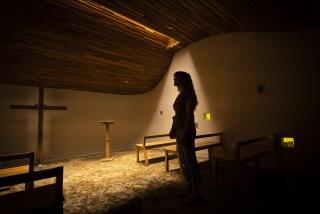InterVarsity Fellowship Blends Evangelism, Social Action : Education: The organization has not hesitated to address controversial issues.
- Share via
As students return to colleges for the fall semester, some from strongly Christian backgrounds will face the challenge of studying on a secular campus that may pose numerous questions about the basis of their faith.
One organization that is poised to help students faced with such problems is InterVarsity Christian Fellowship, celebrating its 50th anniversary this year. IVCF, begun as an offshoot of the InterVarsity Fellowship in Great Britain, has been best known in this country for sponsoring the largest missionary conference in the nation, generally held every three years at the University of Illinois.
Over the years, InterVarsity has been combining evangelism with social action and stressing a personal involvement in both. A highlight of its 1970 conference was an address by evangelist Tom Skinner, a former Harlem gang leader, who drew enthusiastic responses from the students present when he criticized big business, “suburban bliss” and the “myth of democracy” and urged his listeners to become personally involved in the struggle against every kind of oppression.
InterVarsity Press, the organization’s publishing arm, has not hesitated to address controversial issues over the years. However, it bowed to pressure from anti-abortion foes in 1984 and withdrew a book on biomedical ethics entitled “Brave New People,” whose author contended that therapeutic abortion may sometimes be “the least tragic of a number of tragic options.”
The Rev. Stephen Hayner, InterVarsity’s president, drew criticism in 1989 when he said that committed homosexual relationships may be permitted by God in certain circumstances even though homosexuality is “not a part of God’s created order.”
In a telephone interview from his office in Madison, Wis., Hayner said he didn’t think the average observer would find much diversity among the staff on issues such as abortion or homosexuality, while such issues as the charismatic movement and the role of women in ministry have been more controversial within the organization.
“We’ve really tried as much as possible to encompass the breadth of what we would consider to be the evangelical movement over the years,” said Hayner, a minister of the Presbyterian Church (USA). “Our position on the charismatic movement is a good example. Over the years, our position on the charismatic movement has been, ‘Forbid not, require not.’ ”
One episode that could have seriously damaged InterVarsity was the 1987 resignation of Hayner’s immediate predecessor, the Rev. Gordon MacDonald, after confessing his involvement in an adulterous relationship. It came at a time when the nation was rocked by the Jim Bakker sex scandal and when many evangelical ministries were suffering decline in support as a result.
However, InterVarsity suffered no significant losses in its support base from the MacDonald resignation. Hayner said he attributed this to two things: the fact that MacDonald was repentant and the fact that InterVarsity has never been an organization that has been built around personalities.
A strong emphasis of InterVarsity today, Hayner said, is training students in such a way that they understand how to work in a multicultural, multiethnic environment. Last year’s conference at the University of Illinois drew a record 196 American Indians and featured exhibits from missionary agencies from non-Western nations for the first time. In addition, some of the North American agencies exhibiting represented specific ethnic communities, such as African-Americans, Chinese-Americans and Korean-Americans.
As the fall semester opens, InterVarsity has 656 chapters on secular college campuses and about 130 on Christian college campuses through InterVarsity Missions Fellowship. Its budget of $34.4 million is supported largely by individuals and local congregations, according to Hayner.
More to Read
Sign up for Essential California
The most important California stories and recommendations in your inbox every morning.
You may occasionally receive promotional content from the Los Angeles Times.













